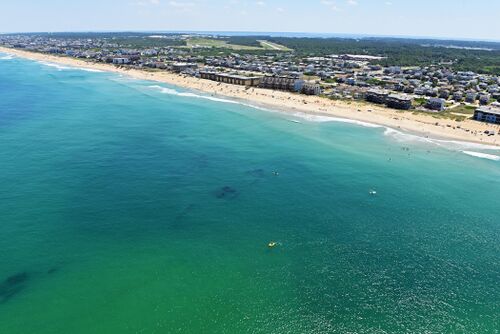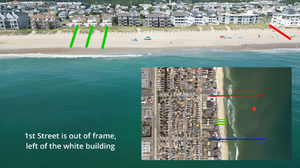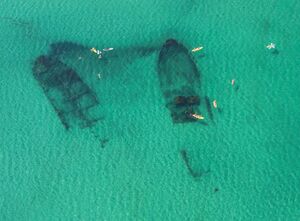Triangle Wrecks: Difference between revisions
No edit summary |
m Note that spearfishers & anglers are a hazard |
||
| Line 58: | Line 58: | ||
* Silt clouds | * Silt clouds | ||
* Monofilament | * Monofilament | ||
Be especially wary when spearfishers and anglers are on the wreck, as they may mistake you for a fish. | |||
===Equipment=== | ===Equipment=== | ||
Revision as of 19:05, 20 August 2023
| Site Info | |
|---|---|
| Type | {{{type}}} |
| Coordinates | "N75°39'50.3"W 36°01'57.4"N 75°39'50.3"W |
| Region | US Atlantic coast |
| Access | Shore |
| Depth range | 5-20ft |
"{{{type}}}" is not in the list (Cavern, Cave, Wreck, Lake, Reef, Cove, Inlet) of allowed values for the "Has site type" property.
[[Category:{{{type}}}]]
The Triangle Wrecks is a wreck dive near Nag's Head, NC in the Outer Banks. It is the site of two shipwrecks which form a rough triangle shape.
In a twist of fate, two vessels met their end in the identical spot, though two years separated their respective accidents. The Kyzikes, a tanker carrying crude oil en route to Spain, foundered in December 1927, due to a violent storm. The tempest led to water breaching the ship, consequently compromising its boiler tubes. Fast forward to 1929, the Carl Gerhard unfortunately met the same fate in that precise location, cutting through what remained of the Kyzikes. It was carrying a cargo of plasterboard.
Underwater, divers can spot debris, including a boiler, which collectively forms a triangular configuration, situated 15-20 feet deep. The dispersed remnants of these ill-fated ships stretch from 100 to 250 yards from the shoreline.[1][2]
Details

There are two wrecks at this site, the Kyzikes and the Carl Gerhard. The Kyzikes ran aground first and the Carl Gerhard cut it in half two years later. The Carl Gerhard is the northernmost wreck.
Guides can be booked via Roanoke Island Dive Shop. They typically do not guide if the waves exceed ~2 ft.
Position
Depth
20ft to the sand.
Visibility
As low as 1ft, as high as 20ft. Increased currents typically correspond to lower visibility as they lift up silt from the bottom creating enormous silt clouds in the vicinity of the wreck.
Topography
Fine sandy bottom.
Conditions
Conditions are highly variable. Expect currents and low visibility.
Facilities
There are freshwater showers at the beach access which can be used to rinse self and gear. There are no changing rooms, public restrooms, or water fountains nearby. A lifeguard may be on duty.
Access

Via 2nd street public beach access, marked in red. There is limited street parking available, expect it to fill up quickly. If it's full there is also a beach access on 1st street but it's a longer walk to the entry area.
Adjust where you get in so that prevailing currents will carry you to the wreck.
Do
Find a suitable shore reference point. One of the buildings is a good choice. Swim out ~100m and use a snorkel from there to find the wreck. If the currents are up it may be easier to get in upstream, swim out and allow the current to carry you into the wreck.
See

Life
There can be a lot of jellyfish on the surface, be wary of these when swimming out.
Dolphins, skates and rays are not uncommon here.
Angelfish may sometimes be found schooling near the wreck as well as miscellaneous small reef fish.
Safety
Hazards
- Strong currents
- Stinging jellyfish
- Low visibility
- Silt clouds
- Monofilament
Be especially wary when spearfishers and anglers are on the wreck, as they may mistake you for a fish.
Equipment
- Full wetsuit recommended due to jellyfish
- Cutting device (or two); monofilament is on the wreck
- Flashlight recommended
- Snorkel - useful for spotting the wreck
Media
Nearby
References